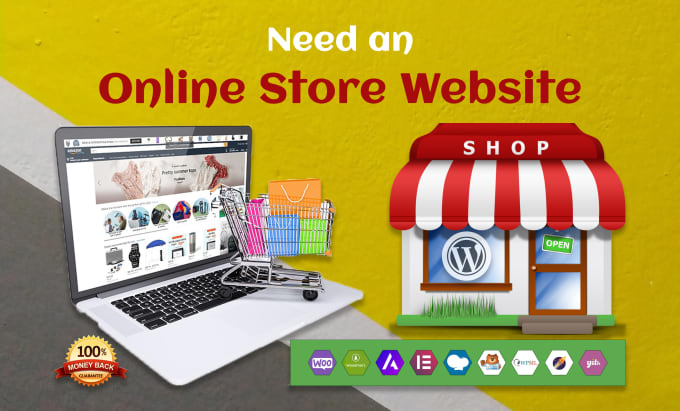Website Development
- Home
- Website Development
Website development is a complex and iterative process that requires collaboration between designers, developers, content creators, and other stakeholders to create a successful and effective online presence for businesses, organizations, and individuals.
WordPress is a widely-used content management system (CMS) that allows users to create and manage websites without needing advanced technical skills. It offers a user-friendly interface, customizable themes and plugins, and a robust ecosystem of tools and resources, making it an ideal platform for blogs, business websites, e-commerce sites, and more. With WordPress, users can easily publish content, customize their website’s design and functionality, and grow their online presence with ease.

Shopify is an e-commerce platform that enables businesses to create and manage online stores. It provides a range of tools and features for building, customizing, and selling products online, including website templates, payment processing, inventory management, and marketing tools. With Shopify, users can easily set up an online store, manage orders and payments, track sales and analytics, and scale their business as needed. It’s a popular choice for entrepreneurs and small businesses looking to establish an online presence and sell products efficiently.

WooCommerce is a customizable e-commerce platform built as a plugin for WordPress websites. It enables users to create and manage online stores with ease, offering features such as product management, payment processing, shipping options, and inventory tracking. WooCommerce provides a flexible and scalable solution for businesses of all sizes, allowing them to sell physical and digital products, manage orders and customer accounts, and customize their online store to meet their specific needs. It’s widely used for building robust and user-friendly e-commerce websites within the WordPress ecosystem.

Squarespace is a website builder platform that allows users to create and customize professional websites without requiring any coding knowledge. It offers a range of sleek and modern templates, intuitive drag-and-drop tools, and built-in features for creating websites for businesses, portfolios, blogs, and online stores. Squarespace provides robust tools for design, customization, and content management, as well as integrated analytics and SEO features to help users optimize their websites for search engines. It’s a popular choice for individuals and small businesses looking to create visually appealing and functional websites with ease.

Wix is a popular website builder that allows users to create professional-looking websites without needing to code. It offers a user-friendly drag-and-drop interface, customizable templates, and a variety of features for building websites for businesses, blogs, portfolios, and more. Wix provides tools for designing the layout, adding content, integrating with third-party apps, and optimizing for mobile devices. It’s a convenient option for individuals and small businesses looking to establish an online presence quickly and easily.

GoDaddy is a well-known web hosting and domain registration company that offers a variety of services for individuals and businesses looking to establish an online presence. In addition to domain registration, GoDaddy provides web hosting, website builders, email hosting, SSL certificates, online marketing tools, and more. It’s known for its user-friendly interface, affordable pricing, and customer support services, making it a popular choice for individuals and small businesses looking to get online quickly and easily.

A custom website refers to a website that is uniquely designed and developed to meet the specific needs and requirements of a business, organization, or individual. Unlike pre-built website templates or website builders, a custom website is built from scratch or tailored extensively to suit the branding, functionality, and objectives of the client.
Key aspects of a custom website include:
Unique Design: Custom websites are designed from the ground up, allowing for a unique and tailored design that reflects the brand identity and aesthetic preferences of the client. Design elements such as color schemes, typography, layout, and imagery can be customized to create a visually appealing and cohesive website.
Tailored Functionality: Custom websites can be developed with specific features, functionalities, and integrations tailored to the needs of the client. This may include e-commerce functionality, content management systems, customer relationship management (CRM) systems, booking systems, and more.
Scalability: Custom websites can be designed and developed with scalability in mind, allowing for future growth and expansion as the needs of the business evolve. This flexibility enables the website to adapt to changing requirements and accommodate new features or functionality over time.
Optimized Performance: Custom websites can be optimized for performance, speed, and user experience, ensuring fast loading times, smooth navigation, and compatibility across different devices and browsers. This optimization enhances the overall user experience and improves search engine rankings.
Security: Custom websites can incorporate robust security measures to protect against cyber threats and ensure the safety of sensitive data. This may include SSL encryption, secure authentication protocols, regular security audits, and compliance with industry standards and regulations.
SEO-Friendly: Custom websites can be built with search engine optimization (SEO) best practices in mind, ensuring that the website is optimized for visibility and ranking in search engine results pages (SERPs). This includes optimizing on-page elements, site structure, content, and metadata to improve organic search visibility.
Ownership and Control: With a custom website, the client retains full ownership and control over the website and its content. This allows for greater flexibility, autonomy, and customization compared to using third-party platforms or templates.
Other website builders, apart from the ones mentioned earlier like Wix, Squarespace, and GoDaddy, include:
Weebly: Weebly is a website builder that offers an intuitive drag-and-drop interface, customizable templates, and built-in features for creating websites, blogs, and online stores. It’s known for its ease of use and flexibility.
Jimdo: Jimdo is a website builder that caters to small businesses and individuals looking to create professional websites without coding. It offers customizable templates, mobile-responsive designs, and e-commerce functionality.
Webflow: Webflow is a powerful website builder that combines a visual design tool with a robust content management system (CMS) and advanced customization options. It’s popular among designers and developers for its flexibility and control over the design and functionality of websites.
Shopify: While primarily known as an e-commerce platform, Shopify also offers a website builder that allows users to create and customize online stores with ease. It’s a popular choice for businesses looking to sell products online.
BigCommerce: Similar to Shopify, BigCommerce is an e-commerce platform that includes a website builder for creating online stores. It offers a range of customizable templates, built-in features for selling products, and integration with third-party apps and services.
WordPress.com: WordPress.com is a hosted version of the WordPress content management system (CMS) that offers a website builder along with hosting services. It provides customizable themes, plugins, and built-in features for creating blogs, business websites, and online stores.
Duda: Duda is a website builder designed for agencies, freelancers, and small businesses. It offers responsive design templates, drag-and-drop editing, and advanced customization options for creating professional websites.
Zyro: Zyro is a beginner-friendly website builder that offers AI-powered tools for creating websites quickly and easily. It provides customizable templates, built-in features for e-commerce, blogging, and more.

